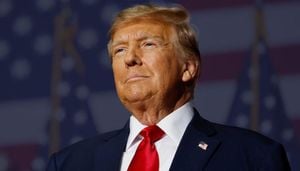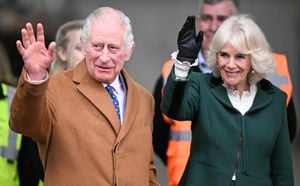Keir Starmer, the Labour leader, is taking significant steps to renew the United Kingdom's relationship with the European Union, initiating talks centered around defense cooperation. This coming Thursday, Starmer is expected to engage with EU leaders after receiving an invitation from the bloc aimed at strengthening ties post-Brexit.
The invitation to meet was reportedly extended by the newly appointed president of the European Council, Antonio Costa, during his recent visit to Downing Street. This will mark the first direct engagement of its kind between UK leadership and EU representatives since the Brexit transition, signaling Labour's intent to amend the rocky relationship the UK has experienced with the EU since distancing itself from the bloc.
Starmer’s discussions are set against the backdrop of mounting criticism faced by Labour, particularly pertaining to its perceived backtracking on Brexit commitments. Rachel Reeves, the party’s Chancellor, met with EU officials recently, which ignited accusations of the Labour Party dragging the UK closer to European policies just as the nation is trying to forge its own path.
This shift revives debates around the UK’s place on the continent, as Starmer insists the Labour government has no intention of rejoining the EU single market or reinstatinng freedom of movement policies. Despite the emphasis on forging stronger ties, the strategic handling of these discussions reflects Labour’s balancing act; they aim to reclaim the public’s trust on the issue of Brexit.
The proposed talks will focus on matters of mutual interest including cybersecurity and the continuing conflict relating to Ukraine, aligning with the shared priorities of Starmer and Costa.
Further commitments made by Starmer not only highlight his desire for enhanced cooperation but also underline the potential for collaboration on international security issues, including human trafficking and people-smuggling. He addressed the influence of Brexit on the UK's security posture, labeling the current situation as transforming Britain’s borders to something resembling “an open-border experiment.”
Live discussions will commence as both leaders aim to salvage and perhaps reshape the notorious relations between the UK and EU, which have, since the Brexit vote, often been plagued with discord and negotiation setbacks.
Starmer has made it clear – attempting to normalize relations is key to engaging effectively with Europe not just politically but economically as well. With Labour’s ambitions to re-engage on the European front, he seeks to transition from the prior government’s tough stance to one of pragmatic dialogue, aiming to create fruitful partnerships without retracing former entanglements.
Meanwhile, the Labour leadership has consistently affirmed their position against compromising the foundational tenets of Brexit. Starmer has reminded critics of his steadfast commitment to “not reinstatement” of the UK’s membership rights or pre-existing framework with the EU, underlining the pressures the party faces from its base as he navigates through this uncharted territory.
Labour’s pathway appears to be strategically positioning itself as the voice of reason amid the public's fluctuated perspectives on Brexit. Drawing on pragmatic approaches as the party looks to lead the debate without dampening its commitment to those who voted to leave the EU.
The upcoming engagements will be observed closely, as they not only signify Starmer’s willingness to engage EU policies but also test underlying sentiments as the discourse around Brexit continues to evolve.



